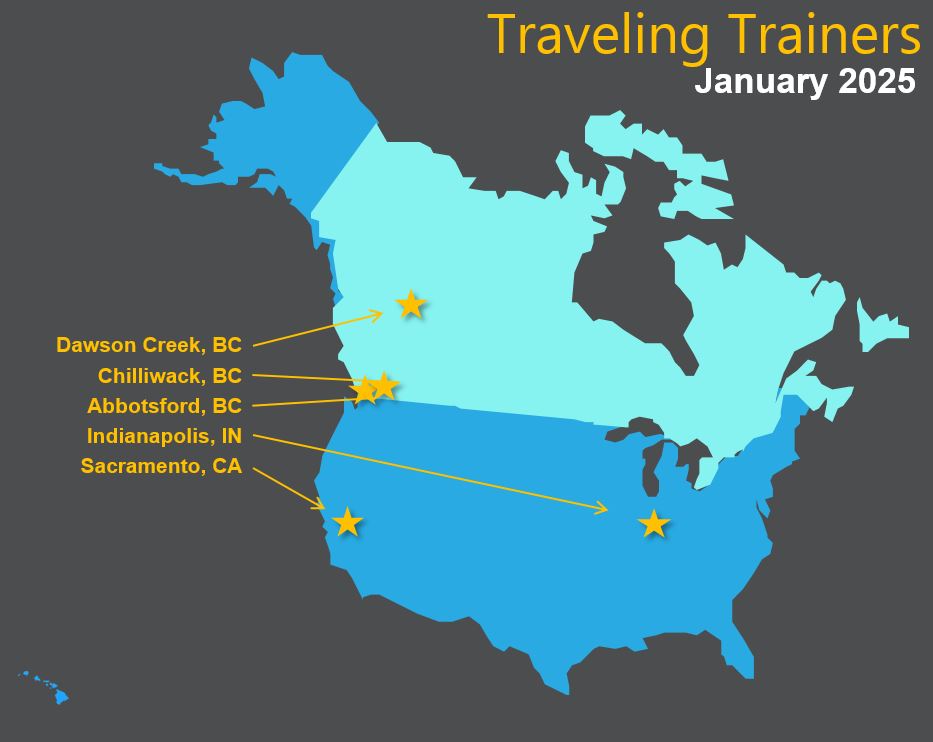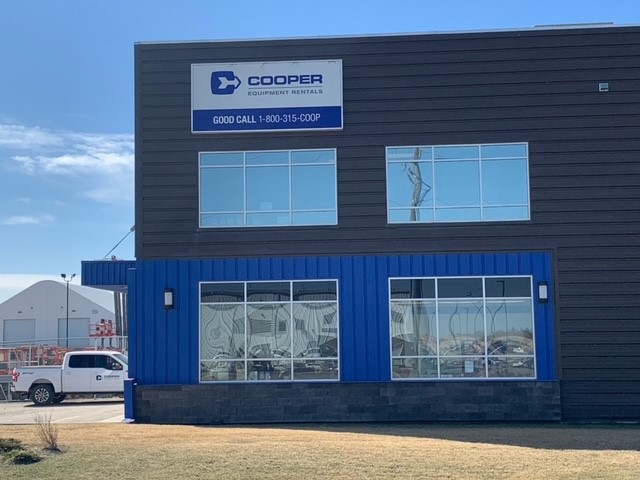
The IVES Update Newsletter is a highly informative monthly e-newsletter. It contains up-to-date industry information, regulatory updates, stories from the field, upcoming program dates, What’s Wrong With This? photos, incident reports, our interactive “Ask Bob” question and answer column, new product details and much more.
Whether you're interested in forklifts, mobile elevating work platforms, loaders or excavators – we’ve got you covered. Want to receive it directly to your inbox? Sign up for our IVES Update e-Newsletter!
Year:

Learning how to operate equipment properly is the first and most important step before starting any job.
This is especially true when it comes to operating forklifts as their set-up and functionalities can vary from machine to machine.
For example, there are seven basic types of forklift classifications based on fuel type, application and features.
Understanding the intricacies of the machine you plan to operate will allow you to be the most productive throughout your day, while also minimising risk of machine misuse or injury.
In honor of National Forklift Safety Day in the United Kingdom and the United States on June 11 this year, consider these tips and best practices to improve performance and productivity on your material handling job site.
Every classification of forklifts operates differently. For example, the set-up and functionality of an electric pallet truck and stacker varies significantly from an internal combustion (IC) pneumatic tyre forklift.
For this reason, it’s important to complete the necessary training and certification process to operate the forklift required for your job site or warehouse. In fact, in the United States the Occupational Safety and Health Administration (OSHA) has rules around training for vehicle inspection and maintenance.
In many instances, dealers will provide opportunities to customers for training, certification and practice using the new machine. That way operators can familiarise themselves with the equipment they plan to use for their various material handling needs.
Operators should complete a daily inspection by walking around and physically assessing the machine.
This daily routine can help identify items such as fluid leaks, tyre tread wear and overall machine condition.
These are some of the important considerations before starting the machine and getting to work.
By taking time at the beginning of your shift to evaluate your forklift, you can reduce the possibility of larger issues down the road.
It’s also important to follow routine maintenance schedules and check oil levels such as; brake fluid, engine, hydraulic and transmission oil levels and the overall condition of your forks.
Despite their design strength and being forged from strong materials forks can wear from normal daily usage. Make sure your forks can carry the load and are not worn, bent or twisted.
Finally, always use your seatbelt and test the mast and lift the forks to ensure they’re running smoothly.
It’s critical to understand the capacity limits of your forklift.
Diligently following the machine’s rated lift specifications and not overloading the truck beyond its net residual capacity rating will minimise potential issues.
Additionally, operators should always pay careful attention to their environment and surroundings.
Are you inside a warehouse where water or other fluids may have leaked onto the floor? Are you outdoors and operating on rough terrain? Do you need to maneuver down a ramp or through debris?
Avoiding high traffic areas, being cognizant of uneven surfaces and using a travel speed that correlates with your environment are safety considerations to keep in mind.
Coupling innovative technology with operators’ work ethic translates to amazing jobsite results.
Telematics can play an important role in keeping operators efficient and productive. For example, operators should always pay special attention to service indicators that give warnings about engines, brakes, overheating or fluid levels – much like you would in your personal vehicle.
Today’s latest forklift models can share critical information and operators should pay attention to whatever their machine is telling them.
Completing forklift training and certification, evaluating your machine, understanding your forklift load capacity limits and operating conditions and adhering to equipment warnings are actionable ways to keep safety top of mind.
By creating a workplace focused on continuous improvement, you can build a culture that values efficiency, productivity and allows operators to accomplish more.
Source: Forklift Action

We are thrilled to announce partnering with Cooper Equipment Rentals to deliver IVES training Programs at their Calgary (Airdrie), Alberta location.
With over 80 locations, Cooper is one of Canada’s largest equipment rental companies specializing in the rental of compact, aerial and heavy construction equipment while providing a wide range of supplies, along with unparalleled service and support since 1972.
“We are supper happy about establishing ourselves in Alberta with Cooper,” says IVES General manager Ron Shankar.
“The industrial growth that’s taken place there over the past 20 years or so is staggering and I think a local IVES presence will be welcomed by a lot of companies. It’s a good move for us.”
IVES will begin offering Equipment Trainer Certification programs there this spring. You can find scheduled dates now at www.ivestraining.com.
Don't miss out on your change to be part of the Columbia Forklift Challenge on March 5, 2025!
Held in Portland Oregon, forklift drivers participate in teams or individually, navigating various timed challenges while being evaluated by judges on their skill and operation.
Cash prizes will be awarded to the top 3 finishers!
Deadline to register is February 14, 2025 and is limited to 30 drivers.
To sign up or read more, click here!
The CSA B354 MEWP standards, which are an adoption of the ISO MEWP standards with Canadian deviation, are set to undergo reviews.
The standards were originally published in 2017 and were reaffirmed in 2022.
As an adoption of ISO standards, the B354 technical committee has awaited republication of the ISO standards that took place in 2024.
This opens the need to complete a 5 year periodic review of the B354 MEWP standards by 2027.
The B354 executive team has begun meeting to begin the approval process to start the meetings for this review.
If you are a past member of the B354 committee or have interest in joining the committee, send your requestion to CSA project leader Erich Hildebrandt (erich.hildebrandt@csagroup.org).
 A U.S. Department of Labor investigation revealed that proper workplace safety training and correct storage of pallets taller than 16 feet could have prevented the fatal injuries suffered by a forklift operator at a tire distribution center in Elm Mott.
A U.S. Department of Labor investigation revealed that proper workplace safety training and correct storage of pallets taller than 16 feet could have prevented the fatal injuries suffered by a forklift operator at a tire distribution center in Elm Mott.
Responding to the June 2024 incident at Mitchell Industrial Tire Co. Inc.’s distribution center, inspectors with the department’s Occupational Safety and Health Administration found widespread safety failures that exposed dozens of employees to potentially serious and deadly injuries.
OSHA inspectors learned the forklift operator was struck by a falling pallet of industrial truck tires after the pallet’s three-tier rack storage system failed. The system’s vertical supports were damaged and the horizontal beam locks were missing. The company was cited for 12 violations, including failing to properly train forklift drivers and improperly storing unbanded pallets higher than 16-feet.
Mitchell Industrial Tire faces $288,299 in proposed penalties.
“Neglecting to train forklift operators properly can lead to devastating consequences, as seen at Mitchell Industrial Tire,” said OSHA Area Director Timothy Minor in Fort Worth, Texas. “The company must comply with safety requirements to protect workers from the many hazards present in warehouses and manufacturing facilities, in line with industry best practices and federal regulations designed to prevent serious injuries and fatalities.”
Founded in 1953, Mitchell Industrial Tire Co. Inc. manufactures solid tires for the material handling industry at its Chattanooga, Tennessee, facility and has three U.S. distribution centers.
Mitchell Industrial Tire has 15 business days from receipt of citation and penalties to comply, request an informal conference with OSHA’s area director, or contest the findings before the independent Occupational Safety and Health Review Commission.
Source: US Department of Labor

Whats your resolution?
Keeping you safe is ours! Use promo code NEWYEAR15 during the month of January and get 15% off any Train the Trainer Program!
Have questions?
Give us a call at 1-800-643-1144 and speak to one of our customer service representatives today!
Ready to sign up?
Visit our training calendar to sign up today and take advantage of this amazing promotion!
 Q: I have two students who have passed the written test, but they both have never been on a forklift before, this will be their first time. Does the practical testing have to happen right away or are they allowed to have a couple days under supervision to do an obstacle course / moving pallets so they are confident enough to lift actual materials / placing them in a rack?
Q: I have two students who have passed the written test, but they both have never been on a forklift before, this will be their first time. Does the practical testing have to happen right away or are they allowed to have a couple days under supervision to do an obstacle course / moving pallets so they are confident enough to lift actual materials / placing them in a rack?
A: Yes, you absolutely can and should allow beginner trainees time and coaching to gain the skill and confidence to operate safely. A couple of days should do very nicely. Just be sure that you are there to directly supervise them while they are training. I would suggest that if you do not have the current IVES lesson plan for your operator training, you can log in to your dashboard and download the most current lesson plan for the machine you are teaching to.
The lesson plan covers step by step on how to conduct each portion of the training. The theory, then the practical training (hands-on learn how to operate) and then the practical evaluation.
Follow the lesson plan for your training and you cannot go wrong

 "I thought this program was well put-together and delivered very well. I would highly recommend IVES Training."
"I thought this program was well put-together and delivered very well. I would highly recommend IVES Training."
Jarred V, Express Standard Forklift Train the Trainer Certification
"I enjoyed all of the class and learned more about what I should’ve been taught over the last 11 years."
Jeff O, Premium Combo Train the Trainer Certification
"Very comprehensive program. The training was easy to follow along and will be easy to implement because of the step by step lesson plans."
Melissa A, Custom Program Train the Trainer Certification
copyright © IVES Training Group 2022 All Rights Reserved.